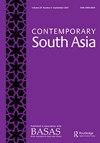“我不知道我们如何才能停止争吵”:一项关于斯里兰卡大学员工和工作人员对争吵现象的看法的定性研究
IF 0.8
3区 社会学
Q3 AREA STUDIES
引用次数: 0
摘要
在斯里兰卡,穿破衣服是一种由来已久的入会仪式,类似于欺侮和欺凌。高年级学生对新生的严重骚扰导致了包括抑郁、大学退学和自杀在内的不良后果。虽然这是一个重要的问题,但对破布的研究却很少。这项研究旨在探索贾夫纳大学的员工和工作相关人员如何对破衣烂衫现象产生共鸣。进行了7次焦点小组讨论和11次半结构化访谈。运用福柯语篇分析和班杜拉的道德脱离理论对数据进行解释。三种主要话语反映了这一背景:衣衫褴褛是正常和必要的,不安全感和对报复的恐惧,以及抵抗的声音。参与者经常感到没有支持,因此调整了他们的道德指南针,以便在这种不安全的环境中生存。这些发现表明,对破衣烂衫采取了一种支离破碎的做法,这不仅削弱了消除破衣烂衫的努力,而且影响了员工被迫调整自己的行为以适应这种环境。为了解决褴褛问题,需要坚持一项一贯的战略,重点是提高认识,并通过追究各级行政人员在促进人人享有安全工作环境方面的责任来支持工作人员。本文章由计算机程序翻译,如有差异,请以英文原文为准。
‘I don’t know how we can stop ragging’: a qualitative study on the perceptions of staff and work-affiliated individuals at a Sri Lankan University, on the phenomena of ragging
ABSTRACT Ragging in Sri Lanka is a longstanding initiation ritual, similar to hazing and bullying. The severe harassment of new students by seniors has led to adverse consequences including depression, university dropouts and suicide. Although, a significant problem, research on ragging is scarce. This research aimed to explore how staff and work-affiliated individuals at Jaffna University resonate around the phenomenon of ragging. Seven focus group discussions and eleven semi-structured interviews were conducted. Foucauldian Discourse Analysis and Bandura’s Moral Disengagement theory were used to interpret the data. Three main discourses reflected the context: ragging as normal and necessary, insecurity and fear of reprisal, and voices of resistance. Participants often felt unsupported and therefore adapted their moral compasses to survive in this insecure environment. These findings demonstrate a fragmented approach to ragging that not only diminished any efforts towards elimination but affected how staff were forced to adjust their behavior to work in this environment. To address ragging, there is a need to adhere to a consistent strategy focusing on increasing awareness and supporting staff by holding accountable those at all levels of the administrative hierarchy in promoting a safe working environment for all.
求助全文
通过发布文献求助,成功后即可免费获取论文全文。
去求助
来源期刊

Contemporary South Asia
AREA STUDIES-
CiteScore
2.10
自引率
0.00%
发文量
82
期刊介绍:
The countries of South Asia - Bangladesh, Bhutan, India, Maldives, Nepal, Pakistan and Sri Lanka - are internally diverse and part of global flows of people, goods and ideas. Contemporary South Asia seeks to address the issues of the region by presenting research and analysis which is both cross-regional and multi-disciplinary. The journal encourages the development of new perspectives on the study of South Asia from across the arts and social sciences disciplines. We also welcome contributions to pan-regional and inter-disciplinary analysis. Our aim is to create a vibrant research space to explore the multidimensional issues of concern to scholars working on South Asia and South Asian diasporas in the postcolonial era.
 求助内容:
求助内容: 应助结果提醒方式:
应助结果提醒方式:


